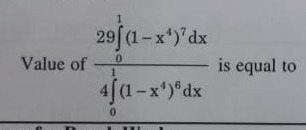Question
Question: Value of $\frac{29\int_{0}^{1}(1-x^4)^7dx}{4\int_{0}^{1}(1-x^4)^6dx}$ is equal to...
Value of 4∫01(1−x4)6dx29∫01(1−x4)7dx is equal to

7
Solution
Let the given expression be E. E=4∫01(1−x4)6dx29∫01(1−x4)7dx
Let In=∫01(1−x4)ndx. The expression can be written as E=4I629I7.
We use integration by parts to find a reduction formula for In. In=∫01(1−x4)ndx. Let u=(1−x4)n and dv=dx. Then du=n(1−x4)n−1(−4x3)dx=−4nx3(1−x4)n−1dx and v=x. Applying the integration by parts formula ∫udv=uv−∫vdu: In=[x(1−x4)n]01−∫01x(−4nx3(1−x4)n−1)dx Evaluate the term [x(1−x4)n]01: [x(1−x4)n]01=1(1−14)n−0(1−04)n=1(0)n−0(1)n=0−0=0 (assuming n≥1). So, In=0−∫01(−4nx4(1−x4)n−1)dx In=4n∫01x4(1−x4)n−1dx
Now, we manipulate the integrand x4(1−x4)n−1 to relate it to In and In−1. x4(1−x4)n−1=(x4−1+1)(1−x4)n−1=(−(1−x4)+1)(1−x4)n−1 x4(1−x4)n−1=−(1−x4)(1−x4)n−1+1⋅(1−x4)n−1 x4(1−x4)n−1=−(1−x4)n+(1−x4)n−1
Substitute this back into the expression for In: In=4n∫01[−(1−x4)n+(1−x4)n−1]dx In=4n[−∫01(1−x4)ndx+∫01(1−x4)n−1dx] In=4n(−In+In−1) In=−4nIn+4nIn−1 In+4nIn=4nIn−1 (1+4n)In=4nIn−1 In=4n+14nIn−1
This is the reduction formula for In. We need to find the value of 4I629I7. Using the reduction formula for n=7: I7=4×7+14×7I7−1 I7=28+128I6 I7=2928I6
Now substitute this expression for I7 into the given expression E: E=4I629I7 E=4I629(2928I6) E=4I628I6
Since I6=∫01(1−x4)6dx, and for x∈(0,1), x4∈(0,1), so 1−x4∈(0,1). Thus (1−x4)6>0 for x∈(0,1). The integral of a positive function over an interval of non-zero length is positive, so I6>0. We can cancel I6 from the numerator and the denominator. E=428 E=7
